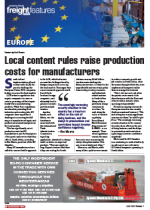South Africa must speed up its visa processes, which are negatively impacting trade with Europe.According to the European Union (EU) Chamber, it has numerous cases of applicants who have waited for over a year and still don’t have a response from the authorities.“We have other cases where visas are tied to large localisation investments, which will only happen if the senior executive in charge of the expansion project gets his/her visa. We must resolve the issues around visas,” said Rui Marto, president of the EU Chamber.Marto, along with Pamina Bohrer, the Chamber’s vice president, has been engaged with South Africa for some time, discussing issues related to immigration, visas and skills.“The way that these matters are managed can have a positive impact on investment and ensure that there are positive spin-offs in terms of job creation, as well as the transfer of skills and technology,” said Bohrer. “The opposite can also be true. The EU remains the largest investor in South Africa and we are committed to ensuring that we engage on any issues that can form a potential barrier to driving economic growth.”The EU Chamber has warned the government that the procedural requirements for professionals and business people seeking to enter South Africa could put new investments and the expansion of existing operations at risk. The inefficient and lengthy process times are seen as an additional barrier to investment, resulting in projects not being completed on time and running over budget. “Considerable delays are being reported by our members in some EU countries,” said Bohrer. “In other cases, there appears to be a lack of urgency for assisting business people who require short-term visas to come to South Africa for meetings and engagements with partners.”The EU Chamber has proposed that a specific visa linked to investment be introduced to help attract new investment initiatives and to bring company skills and upper management to launch company activities. The expansion of existing firms and new firms investing would inevitably increase economic activity and therefore create jobs locally, said Marto.The EU has been South Africa’s largest trading partner, accounting for 22% of total trade (24% of South Africa’s imports and 19% of South Africa’s exports), for years.

